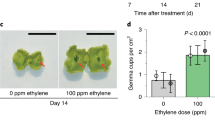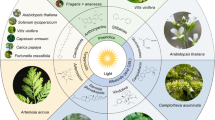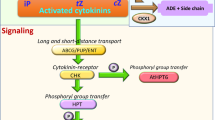Abstract
Ethylene is a natural plant growth regulator often produced in sufficient quantities to alter cellular and developmental processes in a characteristic hormonal manner1. Almost all phases of plant development are affected, including germination, growth, flowering, dormancy, abscission, senescence and sex expression. The earlier view that ethylene is metabolically inert2–4 has been shown to be untenable5–7; low but readily detectable rates of ethylene metabolism have been observed in several plant tissues. These and other studies8–10 indicate that this metabolism does not represent a system for the removal of the ethylene but instead represents the initial biochemical events in the action of ethylene in the plant. Here we report that one of the stable end-products of this ethylene metabolism is ethylene glycol, while for the ethylene mimic propylene, it is 1,2-propanediol.
This is a preview of subscription content, access via your institution
Access options
Subscribe to this journal
Receive 51 print issues and online access
$199.00 per year
only $3.90 per issue
Buy this article
- Purchase on Springer Link
- Instant access to full article PDF
Prices may be subject to local taxes which are calculated during checkout
Similar content being viewed by others
References
Abeles, F. B. Ethylene in Plant Biology (Academic, New York, 1973).
Abeles, F. B. A. Rev. Pl. Physiol 23, 259–292 (1972).
McGlasson, W. B. Biochemistry of Fruits and Their Products (Food Sci. Tech. Monogr. Ser., Academic, New York,1970).
Varner, J. E. & Ho, D. T. Plant Biochemistry 3rd edn (Academic, New York,1976).
Beyer, E. M. Jr Nature 255, 144–147 (1975).
Beyer, E. M. Jr Pl. Physiol. 56, 273–278 (1975).
Beyer, E. M. Jr Pl. Physiol. 63, 169–173 (1979).
Beyer, E. M. Jr Pl. Physiol. 60, 203–206 (1977).
Beyer, E. M. Jr & Sundin, O. Pl Physiol. 61, 896–899 (1978).
Beyer, E. M. Jr. Pl. Physiol. 63 (in the press).
Beyer, E. M. Jr Pl. Physiol. 55, 845–848 (1975).
Buxton, G. V., Green, J. C. & Sellers, R. M. J. J. Chem. Soc. Dalton Trans. 2160–2165 (1976).
Jerie, P. H. & Hall, M. A. Proc. R. Soc. B200, 87–94 (1978).
Hall, M. A. Br. Pl. Growth Reg. Gp News Bull. 2, 1–5 (1978).
de Bont, J. A. M. & Albers, R. A. J. M. Antonie Van Leeuwenhoek J. Microbiol. Serol. 42, 73–80 (1976).
Author information
Authors and Affiliations
Rights and permissions
About this article
Cite this article
Blomstrom, D., Beyer, E. Plants metabolise ethylene to ethylene glycol. Nature 283, 66–68 (1980). https://doi.org/10.1038/283066a0
Received:
Accepted:
Issue Date:
DOI: https://doi.org/10.1038/283066a0
This article is cited by
-
Zum Konzept der reversiblen Konjugation bei Phytohormonen
The Science of Nature (1991)
-
The measurement of ethylene binding and metabolism in plant tissue
Planta (1989)
-
Mechanisms of ethylene action
Plant Growth Regulation (1984)
-
Ethylene metabolism in Pisum sativum L.: Kinetic parameters, the effects of propylene, silver and carbon dioxide and comparison with other systems
Plant Growth Regulation (1984)
Comments
By submitting a comment you agree to abide by our Terms and Community Guidelines. If you find something abusive or that does not comply with our terms or guidelines please flag it as inappropriate.



